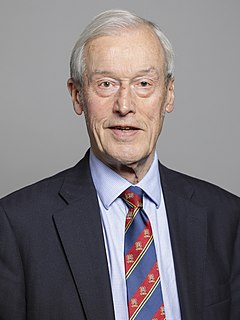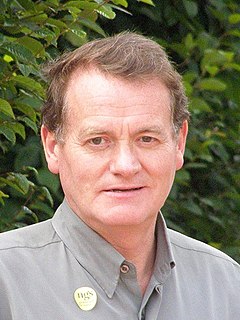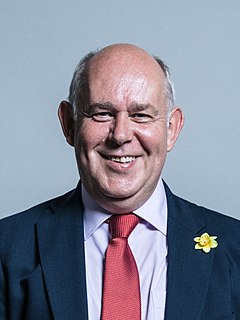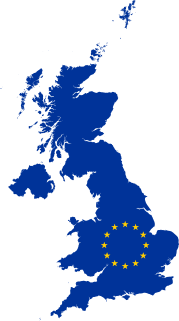
In Westminster and other parliamentary systems, a backbencher is a member of parliament (MP) or a legislator who occupies no governmental office and is not a frontbench spokesperson in the Opposition, being instead simply a member of the "rank and file".

The speaker of the House of Commons is the presiding officer of the House of Commons, the lower house and primary chamber of the Parliament of the United Kingdom. The current speaker, Sir Lindsay Hoyle, was elected Speaker on 4 November 2019, following the retirement of John Bercow. Hoyle began his first full parliamentary term in the role on 17 December 2019, having been unanimously re-elected after the 2019 general election.

Alan Gordon Barraclough Haselhurst, Baron Haselhurst, is a British Conservative Party politician who served as Member of Parliament (MP) for Saffron Walden from 1977 to 2017, having previously represented Middleton and Prestwich from 1970 to 1974. Haselhurst was Chairman of Ways and Means from 14 May 1997 to 8 June 2010, and later Chairman of the Commonwealth Parliamentary Association between 2011 and 2014. He was the oldest Conservative MP when he stood down at the 2017 general election. In May 2018, he was appointed as a life peer, and currently sits in the House of Lords as Baron Haselhurst.

David John Maclean, Baron Blencathra, is a Conservative Party life peer. He was the Member of Parliament (MP) for Penrith and The Border from 1983 to 2010.

Elfyn Llwyd is a Welsh barrister and politician. He was a Member of Parliament, representing Meirionnydd Nant Conwy in the House of Commons from 1992 to 2010 and Dwyfor Meirionnydd from 2010 to 2015. Llwyd was Plaid Cymru's Westminster parliamentary group leader.

Albert Owen is a Welsh Labour Party politician who served as Member of Parliament (MP) for Ynys Môn from 2001 to 2019. He took the seat in the 2001 election from Plaid Cymru with a margin of exactly eight hundred votes and retained the seat at the four subsequent general elections. During his time in Parliament, he was a member of the Business, Energy and Industrial Strategy Select Committee, Welsh Affairs Select Committee and the International Development Committee. He was also a member of the Speaker's Panel of Chairs and vice-chair of the all-party parliamentary group on cancer.
David Wilshire is a British former politician. A member of the Conservative Party, he was the Member of Parliament (MP) for Spelthorne in Surrey from 1987 to 2010. Wilshire was considered to be to the right of the party's mainstream.

Graham Eric Stringer is a British Labour Party politician serving as MP for Blackley and Broughton since 1997. Before entering Parliament, he served as leader of Manchester City Council from 1984 to 1996, and chair of Manchester Airport plc from 1996 to 1997. Stringer is a prominent Eurosceptic.
The Campaign for Freedom of Information is an advocacy group that promotes and defends freedom of information in the UK. It seeks to strengthen the public's rights under the Freedom of Information Act 2000 and related laws and opposes attempts to weaken them. It does this through campaigning, the publication of briefings and other reports and research. The Campaign also provides advice to the public, assistance to people challenging unreasonable refusals to disclose information and runs training courses on freedom of information.
Freedom of information legislation in the United Kingdom is controlled by two Acts of the United Kingdom and Scottish Parliaments respectively, which both came into force on 1 January 2005.

Certain governments in the United Kingdom have, for more than a century, attempted to find a way to reform the House of Lords, the upper house of the Parliament of the United Kingdom. This process was started by the Parliament Act 1911 introduced by the then Liberal Government which stated:
...whereas it is intended to substitute for the House of Lords as it at present exists a Second Chamber constituted on a popular instead of hereditary basis, but such substitution cannot be immediately brought into operation

The Sexual Offences Act 1967 is an Act of Parliament in the United Kingdom. It legalised homosexual acts in England and Wales, on the condition that they were consensual, in private and between two men who had attained the age of 21. The law was extended to Scotland by the Criminal Justice (Scotland) Act 1980 and to Northern Ireland by the Homosexual Offences Order 1982.

The Parliamentary Voting System and Constituencies Act 2011(c. 1) is an Act of the Parliament of the United Kingdom that made provision for the holding of a referendum on whether to introduce the Alternative Vote system in all future general elections to the UK Parliament and also made provision on the number and size of parliamentary constituencies. The Bill for the Act was introduced to the House of Commons on 22 July 2010 and passed third reading on 2 November by 321 votes to 264. The House of Lords passed the Bill, with amendments, on 14 February 2011, and after some compromises between the two Houses on amendments, it received Royal Assent on 16 February 2011.
The European Union (Referendum) Bill 2013–14 was a private member's bill of the Parliament of the United Kingdom designed to make provision for a referendum on membership of the European Union to be held in 2017 following renegotiation of terms between the European Union and the United Kingdom government. The bill ceased to be considered by Parliament after January 2014 and did not become law. However, a subsequent bill with the same objective, the European Union Referendum Act 2015, was later introduced to the House of Commons by the newly elected Conservative government in May 2015 was passed and received royal assent on 17 December 2015.

The European Union (Withdrawal) Act 2018 is an Act of the Parliament of the United Kingdom that provides both for repeal of the European Communities Act 1972, and for parliamentary approval to be required for any withdrawal agreement negotiated between the Government of the United Kingdom and the European Union. The bill's passage through both Houses of Parliament was completed on 20 June 2018 and it became law by Royal Assent on 26 June.

The European Union Act 2017 was an Act of the Parliament of the United Kingdom to empower the Prime Minister to give to the Council of the European Union the formal notice – required by Article 50 of the Treaty on European Union – for starting negotiations for the United Kingdom's withdrawal from the European Union. It was passed following the result of the 2016 United Kingdom European Union membership referendum held on 23 June in which 51.9% of voters voted to leave the European Union.

Parliamentary votes on Brexit, sometimes referred to as "meaningful votes", were the parliamentary votes under the terms of Section 13 of the United Kingdom's European Union (Withdrawal) Act 2018, which requires the government of the United Kingdom to bring forward an amendable parliamentary motion at the end of the Article 50 negotiations between the government and the European Union in order to ratify the Brexit withdrawal agreement.

The European Union (Withdrawal) Act 2019, commonly referred to as the Cooper–Letwin Act, was an Act of the Parliament of the United Kingdom that made provisions for extensions to the period defined under Article 50 of the Treaty on European Union related to the United Kingdom's withdrawal from the European Union. It was introduced to the House of Commons by Labour MP Yvette Cooper and Conservative MP Sir Oliver Letwin on 3 April 2019, in an unusual process where the Government of the United Kingdom did not have control over Commons business that day.

The European Union (Withdrawal) Act 2019, commonly informally referred to as the Benn Act after the Labour MP Hilary Benn as Chair of the Exiting the European Union Select Committee who introduced it, was an act of the Parliament of the United Kingdom that required the Prime Minister of the UK to seek an extension to the Brexit withdrawal date—then scheduled for 31 October 2019—in certain circumstances. The main provisions of the Act were triggered if the House of Commons did not give its consent to either a withdrawal agreement or leaving without a deal by 19 October 2019. The Act proposed a new withdrawal date of 31 January 2020, which the Prime Minister was obliged to accept if the proposal was accepted by the European Council.









